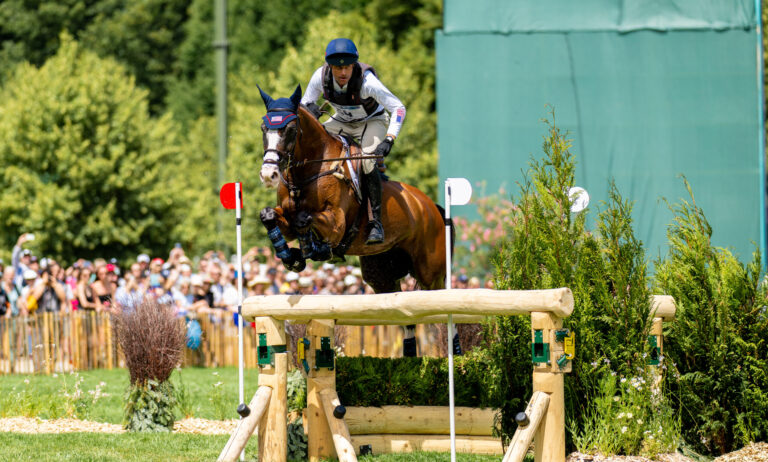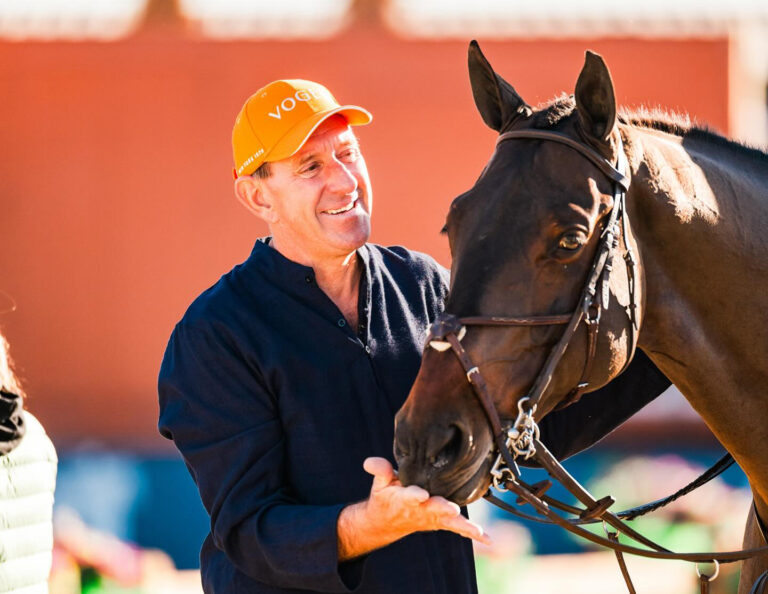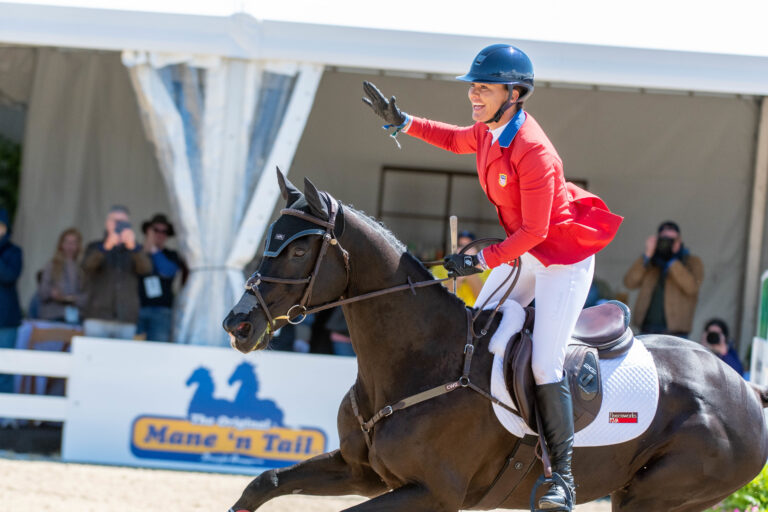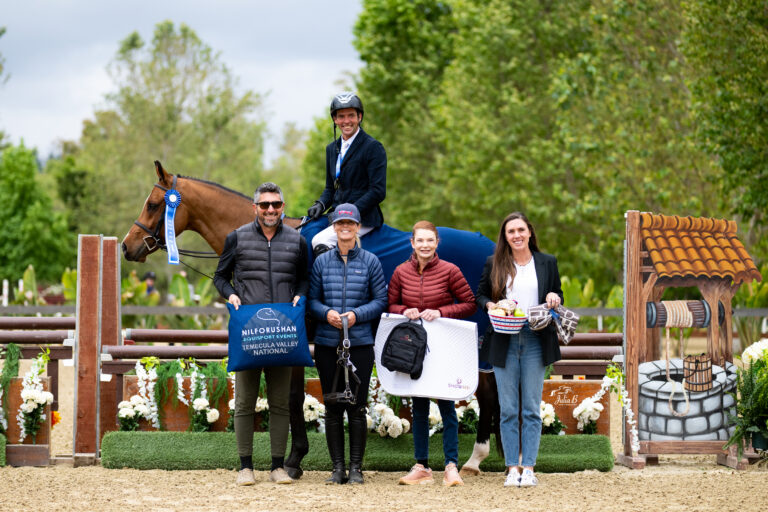Four-star eventer William “Randy” Ward says his skin color sets him apart in the equestrian realm, but it does not set him back. That happens when he leaves the barn or the show grounds to go about his business in the wider world. And that’s a reality with which his mostly white friends in the mostly white equestrian milieu have no experience. He doesn’t talk about it often, but the reality is 24/7.
“The horse world is a little unique because it’s made up of a bunch of tight-knit, family-oriented people,” says Ward, whose WRW III Equestrian business is based in Ocala, Florida. “So, I think it’s hard for people in the riding world to relate to the Black Lives Matter movement.” Ward’s perspective is shared by that of other equestrians of color we spoke with for this article: California grand prix jumping rider Mavis Spencer, California FEI dressage rider Genay Vaughn and Texas hunter/jumper trainer Berry Porter. While the horse world is not immune to racism, they all acknowledge, their personal paths have not been obstructed by it. All agree that conversations that can help fill the experience gap are a good thing to emerge from the renewed intensity surrounding the Black Lives Matter movement.
Such conversations engender empathy and understanding that can manifest in many ways. Giving voice, visibility and connections to equestrians of color are examples of turning talk to positive action, as are finding ways to attract minorities to the sport and support them in it. Above all, the riders we interviewed hope the BLM-inspired conversations challenge all to examine their own words and actions to see how we can contribute to making equestrian sports more accessible, welcoming and colorful. As Vaughn notes, Fortune 500 companies and educators have long touted the benefits of diversity. “It’s not just because of BLM,” Vaughn says. “Research shows that organizations perform better with a more diverse makeup. BLM is a catalyst to necessary progress.” Diversity, she adds, is also “the right thing to do.”
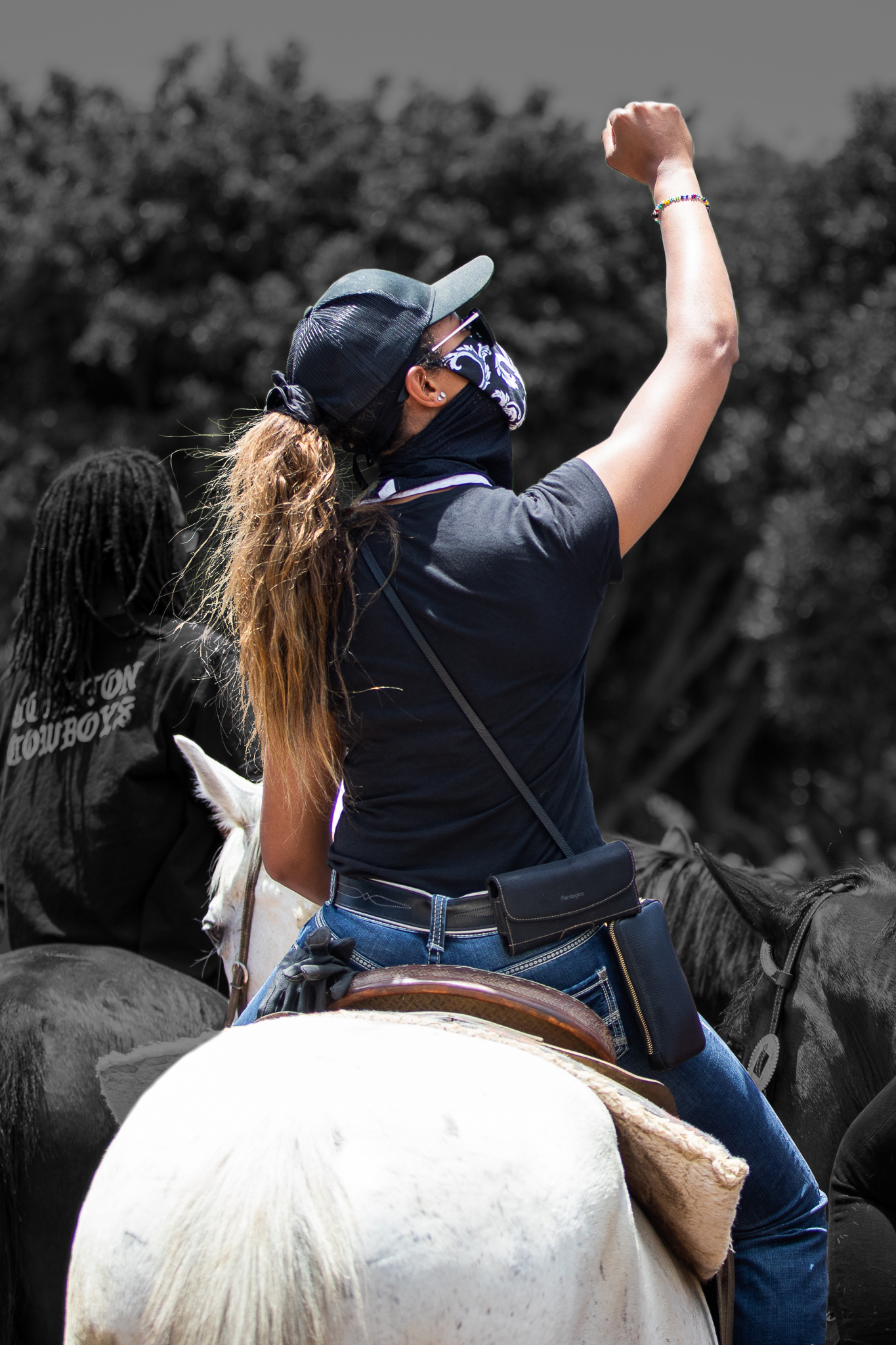
Lindsey Long
Mavis Spencer
Mavis Spencer was introduced to horses when she was 2 years old by her aunt Meg Douglas-Hamilton, the eighth-generation horsewoman who runs the company that revolutionized sporthorse breeding by developing the Equitainer to transport semen.
Spencer has since groomed, trained and competed on the international show jumping circuit. At only 29 and returning from a back injury, she is newly poised for top-level success as the rider for Georgy Maskrey-Segesman’s hunter/jumper sales and leasing business, Whitethorne Ranch in Somis, California. Spencer will also be the California outpost for European Champion Martin Fuchs and Paris Sellon’s new Twin Flame Horses sales endeavor.
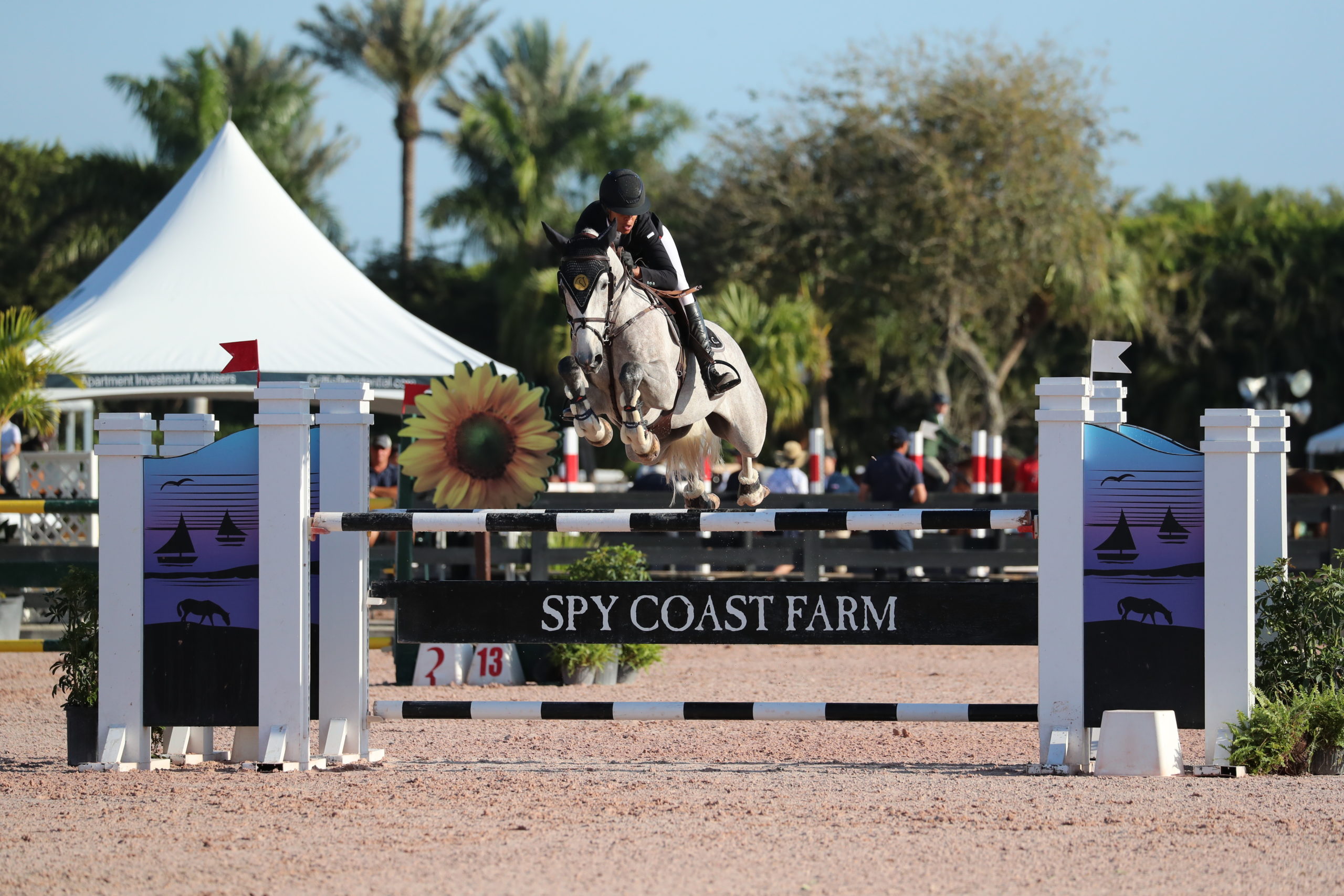
Sportfot
Spencer had a stellar junior career with hunter/jumper trainers Dick Carvin and Francie Steinwedell’s Meadow Grove Farm (where she and Paris Sellon became close friends) and worked for show-jumping Olympian Kent Farrington, Ireland’s World Equestrian Games rider Darragh Kenny and horse-sales business Neil Jones Equestrian. She started each position as a groom, an education and experience to which she credits much of her success.
Spencer’s parents are the award-winning actress Alfre Woodward and writer/director Roderick Spencer. She recalls being aware that her skin color was different than most contemporaries growing up on the hunter/jumper show circuit. “I was very lucky. A lot of people have stories of feeling very discriminated against because of their skin color, but my stories about that did not happen in our industry. I never felt like it kept me from getting where I am now or that it helped me. It’s when we left that barn that I dealt with it in all aspects of life.”
“I’ll never forget seeing my [younger] brother handcuffed and sitting on the curb by the roadside,” she shares of one such incident. “It didn’t matter that my brother had nothing to do with the situation. It didn’t matter who our mother was. It was only about him being a Black male in the wrong place. It was so far out of our control: There was nothing we could do about it, except doing what we could to not escalate the situation.
“It doesn’t take much for that situation to end badly,” she continues. The scenario explains much of “what the Black Lives Matter movement is all about.” Although this incident occurred before the current BLM focus following George Floyd’s death, Spencer had not engaged in public activism until recently. A firm work ethic was a foundation of her upbringing, yet she acknowledges living in a “bubble of privilege where racism had not necessarily touched me.”
Spencer had helped open doors to equestrian sports through volunteering for the Compton Jr. Posse, founded and run by Mayisha Akbar. For more than 25 years, the Posse’s ranch in South Los Angeles’ Compton enabled hundreds of Black and lower-income kids to learn to ride and care for horses. Thanks in part to a show scholarship program with organizers, West Palms Events, a handful of graduates have gone onto careers in the hunter/jumper world.
Following George Floyd’s May 25 death, friends and followers on Spencer’s Instagram account began asking about her stance on BLM. She clarified it to her 40,000 followers in a May 31 post of Desmond Tutu’s quote: “If you are neutral in situations of injustice, you have chosen the side of the oppressor.” A few days later, she shared the story of her brother handcuffed on the curb less than 100 feet from his own door, mistakenly identified as a perpetrator of a crime who was taller, darker and dressed completely differently than her brother and appeared 10 years older. Her intention was “to illustrate that being privileged does not mean you are spared from social injustice or exempt from racism.”
Spencer continues to use her digital platform to educate and inspire action. She also signed on to the U.S. Hunter Jumper Association’s Diversity Task Force (see sidebar “Addressing Diversity,” below) and created with friends the Equestrian Diversity Alliance Facebook group. The latter endeavor aligns with what Spencer sees as a big upside of calls for inclusion and diversity in equestrian sport: The awareness that “there are a lot more Black equestrians than most of us realized.”
The Facebook group is a “place we can introduce ourselves and share our experiences with fellow equestrians of color. I’ve met some amazing people that I never would have known otherwise.” She hopes the Equestrian Diversity Alliance will be one of many means for increasing representation of minorities in horse sports. Seeing more relatable people in equestrian catalogs and media will encourage more people of color to see it as a possible pursuit.
Representation alone won’t fix a major reason for equestrian sports being mostly white. “Having the conversation about diversity in our industry always comes back to systemic racism because of financial constraints that have been in place for hundreds of years,” she asserts. “That system needs to change.”
Speaking up is tricky in these politically divisive days. “If I’d been talking about this before the current movement, people would have said, ‘Oh, that’s all she cares about.’ Now, I’ve had some people warn me I might lose sponsors or clients [because of speaking up]. Some people are upset that a lot of big names in our industry aren’t speaking up about this. It’s a very thin line people walk.
“This is the reality I’ve always lived with and I’m not going to not talk about it. I don’t feel that it’s my duty to educate people, but if you want there to be change, you can’t sit back and watch other people do everything. I’m fortunate to be in a position where I’ve never had to tolerate ignorance and stupidity because I needed to keep a client or a sponsor.”
While Spencer’s parents never forced activism on their kids, they frequently stand up for social causes. As role models, they embodied Dr. Suess’ motto about speaking up: “Those who mind don’t matter, and those who matter don’t mind.” Spencer plans to keep speaking up.
Randy Ward
Ward is grateful to have been introduced to horses by his late father, Wallace Arthur Ward, a former racing commissioner of Massachusetts who also started a riding school in the Boston suburb of Revere. “He always loved horses and had a great appreciation for them,” Ward says.
Ward also played hockey and soccer growing up, but horses were in his blood as much as his father’s. He began to event seriously at 12 or 13 while taking lessons from multi-Olympic medalist Michael Plumb. He continued training to Fourth Level dressage and competed in jumper shows as a young rider. At the same time, Ward’s dad became one of the first to import horses for the sport, first from Hungary, then from all over Europe. At 17 or so, Ward began accompanying his father on the buying trips, deepening a bond already strong from their shared love of horses. “Whether or not we found horses we liked didn’t matter, it was always a win because I was having a good time with my dad.”
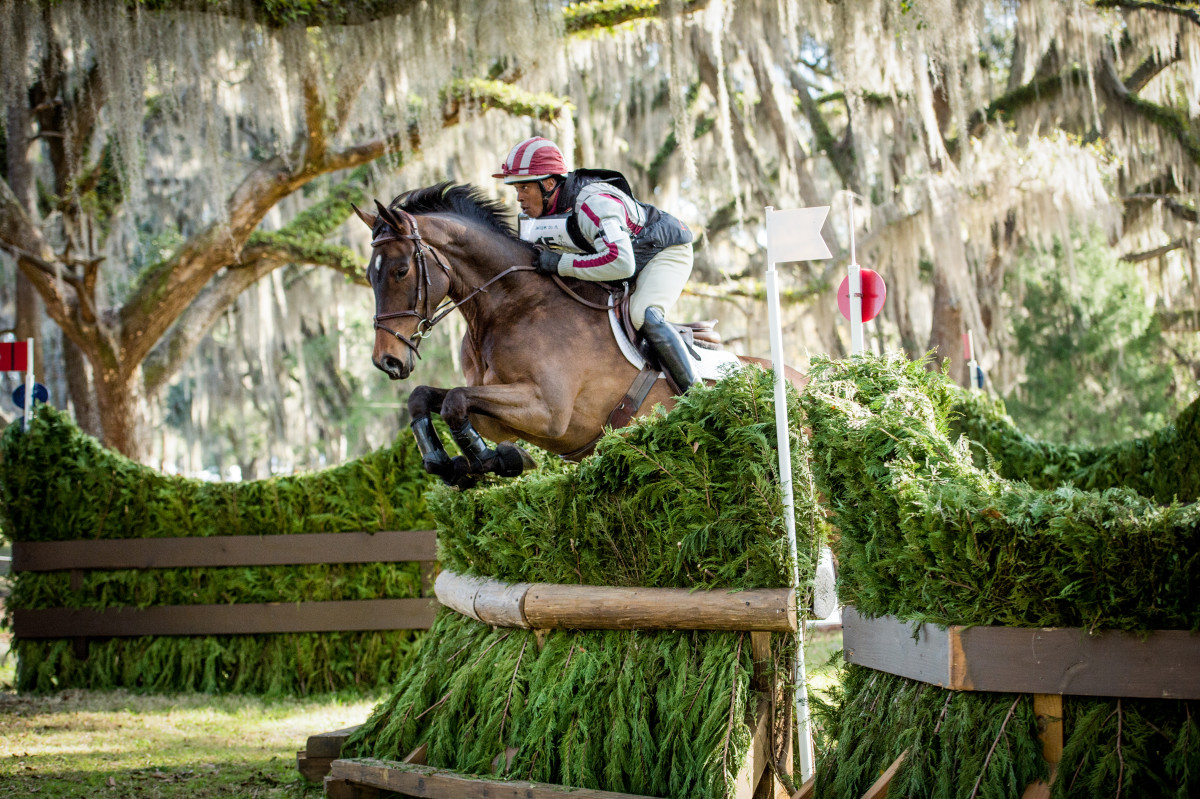
Shannon Brinkman
Ward counts Bruce Davidson and Bruce’s son, Buck Davidson, as longtime mentors and close friends throughout a career that includes four-star competition, young-horse development and coaching. Having recently sold an upper-level contender, Ward is currently in a “building year” with his own riding, bringing Novice, Training and Preliminary horses up the ranks. “It’s kind of like baseball,” he notes. “As soon as an older one goes, you are trying to bring along the young ones to keep things going.” Meanwhile, a steady clientele of students and horses in training keeps him busy. “I’m fortunate to be able to do this professionally.”
Ward admits the current surge in interest about Black realities in America is “a little annoying.”
“Why now?” he asks. What happened to George Floyd “isn’t new and it’s not just happening to poor Black men. It happens to Black men of all backgrounds.” His own experiences include being pulled over by police. “I was the Black kid, driving a nice car in a nice area. Not doing anything wrong, not even speeding. And, even if I was speeding, I should have just gotten a ticket.” Instead, he was dragged out of his car and his car was searched. He’s grateful recent events have brought the important matter of racial inequality to the forefront but worries that “people are talking about all this now because it sells.” He wonders how long the focus will continue—and ultimately, how much will translate into positive action. “I do think it’s great that this has stirred up new awareness. That’s not going to cure anything, but hopefully we can make it better.”
Of the call for more diversity in the sport, Ward says, “Sure, but how? Integrating a school means you make it so Black and white kids are mixed in their class and they have the same opportunities to learn. But how do you do that in our sport when it still takes money to do it?
“The horse world in general is not an easy sport to be exposed to, no matter the color of your skin,” he continues. “I was lucky that my parents were able to give me the opportunity to get into it. Otherwise, it would have been a bit difficult.” In his early riding days, the presumption of an unwelcoming environment may have kept minorities out of the sport, regardless of their financial capabilities. Today, he believes that’s not as much the case and that finances are the main barrier. Ward relays his dad’s simple wisdom when asked how equestrians can make their sport and industry more diverse, welcoming and supportive: “Treat people with kindness.” That includes “educating yourself to what the problems are and keeping them in mind. And, if you see something, say something. Don’t ignore it. Think about how you can help somebody in that situation. Often, we can do a lot more than we realize.”
Berry Porter
A pre-school pony ride was all it took to hook Houston-area hunter/jumper trainer Berry Porter on horses. “My parents worked in the oil and gas industry and really had no interest in horses or even animals,” Porter explains. “They never paid for a riding lesson.” Instead, his instantly ignited passion drove him to find any opportunity to be around horses: Future Farmers of America, 4-H and, later, investing sweat equity for any chance to ride, no matter the saddle or style. Trading labor for saddle time at a relative’s summer camp helped demonstrate how beneficial horses could be for a “hyper kid,” Porter recalls. His parents eventually said yes to his pleas for a horse. They found a $300 horse at an auction, kept it on a family-owned field and let their son lead the way.
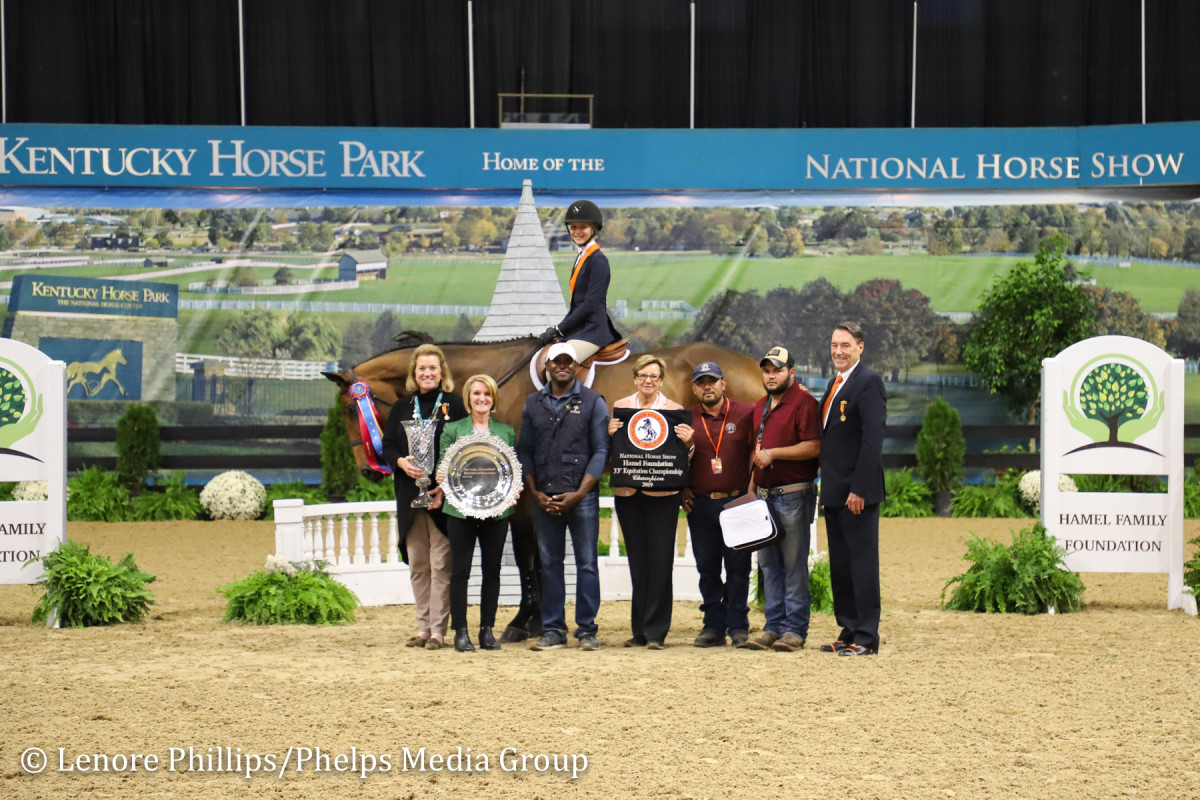
Lenore Phillips/Phelps Media Group
Porter’s path to A-circuit success, as a rider and for the students and horses at his Brookside Pine Farms, is evidence of a welcoming industry, he says. “I came into it with no money, no education and being the token Black guy.”
“There’s been so much talk about how we can improve our sport to be more inclusive and diverse and there’s always room for improvement,” he continues. “But there were no stone walls blocking me.” If anything, his skin may have “made me more recognizable.”
Porter and business partner Sean Brennan built Brookside Pine from scratch on a 100-acre parcel in the Houston suburbs in 2008. Since then, Porter’s accomplishments as a trainer and coach have overtaken skin color as the reason he stands out in the sport. The fall of 2019 was a particularly banner season: Vivian Yowan and Calou won the World Champion Hunter Rider Adult Amateur Hunter Challenge at the Washington International Horse Show, Eleanor Rudnicki and CF Cosmic won the Taylor Harris Insurance National Children’s Medal Finals at The Capital Challenge and Hallie Grimes’ many victories included a hotly-contested ASPCA Maclay class at the Devon Horse Show.
“If more Black people want to be in the sport, they should do it,” he states. “They can see in me that somebody has done it and been welcomed. Everyone has a long way to go, but the horse industry is so far ahead of the rest of the world when it comes to acceptance of color and LGBTQ people.” He’s excited to be part of the USHJA’s Diversity Task Force, and especially the fact “that we are not starting from scratch. There are so many successful Black equestrians and we should be highlighting them.”
Porter recalls being the only person of color in his early equestrian activities. It wasn’t much different than attending a predominately white school and living in a predominately white neighborhood. As an adult, he realized that his parents had shielded him from incidences of systemic racism while growing up in the South.
As he zeroed in on an equestrian career, the professionalism of the hunter/jumper discipline appealed. “I love the customer satisfaction emphasis of it and the emphasis on education.”
Mike McCormick and Tracy Fenney, of hunter/jumper stable MTM Farms in Flower Mound, Texas, were key mentors for Porter as a young professional. “Mike taught me a lot about how to get horses ready. He told me that I was a great rider when things went right, but I needed to have a plan for when things went wrong.” In recent years, Missy Clark and John Brennan of North Run have provided collaboration and guidance as Porter’s clients excel on the hunter/jumper circuit’s most competitive stages.
Awareness of being Black “occupies zero energy for me,” Porter explains. Yet, he fully appreciates the need to open doors for more equestrians of color. Overcoming socio-economic barriers to sport access is tough on a broad scale, but he’s optimistic about the cumulative effect of individual efforts. Prior to the COVID restrictions, Porter had arranged to give a leg-up to a young equestrian of color. She had to relocate, but he hopes the opportunity will re-emerge. “It’s great that all these discussions about diversity are happening, and I hope they continue.”
Genay Vaughn
“You won’t see a lot of Black women riding,” said TV news reporter Ashley Williams during a July 29 Good Day Sacramento segment on 26-year-old FEI dressage rider Genay Vaughn. The host encouraged young kids of color to check out Vaughn as “one of the top riders in the country.” Just as 2000 Olympic gymnast Dominque Dawes had inspired Williams to think she could become an international gymnast, Vaughn is as an example of what’s possible for equestrians of color, Williams indicated. In the short news segment, Vaughn, a partner with her mother, Michele Vaughn, and head trainer at Starr Vaughn Equestrian in the Sacramento area, accomplished one of the things she considers most critical to increasing diversity in equestrian sport: exposure. “If you never encounter the ocean, a pond or pool, how would you ever learn to swim?” asks Vaughn.
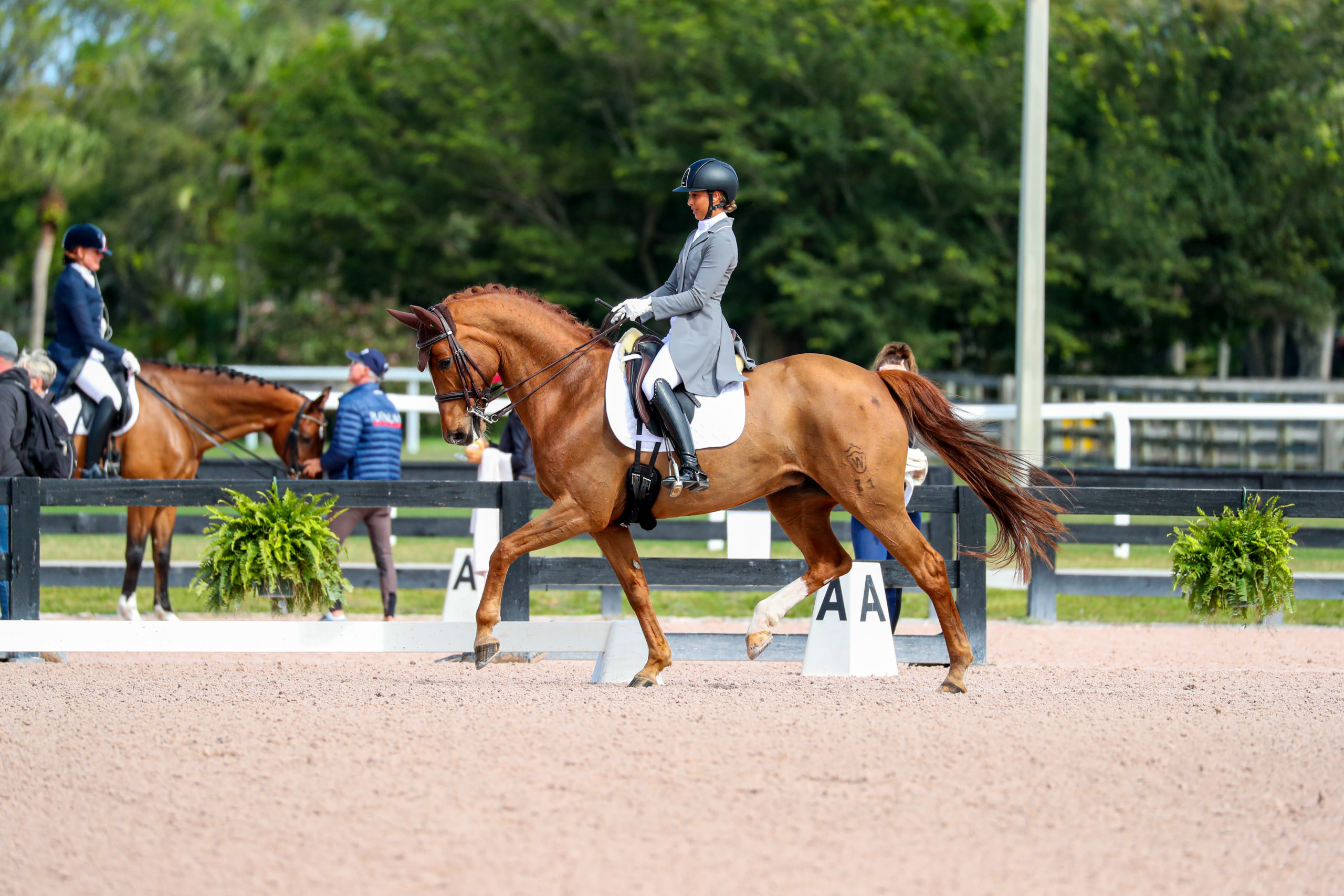
Susan J. Stickle
After a top Young Rider and U25 career, nationally and in Europe, Vaughn retired her international partner, Donarweiss GGF, from competition and he is now enjoying life as a breeding stallion. She and Fürstin P were contesting Prix St. Georges and Intermediaire I before COVID and plan for a Grand Prix debut next year. She’s bringing along several prospects and working with training horses and students while in California. She also works part of the year for Helgstrand Dressage in Wellington, Florida.
Vaughn’s exposure to horses came early, from her mother, a trainer, show manager and pillar of the California dressage scene. Her exposure to the dedication required of a professional athlete came from her father, retired baseball star Greg Vaughn. Although she says her skin color didn’t impede her progress in the sport as a young rider, Vaughn hopes that others won’t have to wait until they’re 15 to see another rider of color, as she did. Since she moved into the high-performance arena, “I have witnessed looks of surprise when others come to find that I am a rider and not a groom at competitions.
“The truth is, as a person of color, when you walk into the room, even if you walk in wearing the uniform that communicates that you’re there to compete, people will see you differently. This is even more so if you’re Black and you’re really good, because you are defying expectations of what Black people can do. We are an affront to some people’s limited world view.”
The 2016 University of California Davis graduate encourages a broad view of diversity’s benefits. “Our most profitable corporations and brightest universities have recognized the value in enacting institutional change,” she observes. “This is not just because of BLM. Research shows that organizations perform better with a more diverse makeup. BLM is a catalyst to necessary progress.”
She believes that equestrian sports are uniquely capable of leading the way. “We have an opportunity to distinguish ourselves in the sports world as a community that embraces diversity and provides opportunity to experience all that equine culture has to offer,” Vaughn continues. The sport is rooted in the connection between horse and rider. “And that, like our horses, knows no color.
“Everyone looks for a role model they can relate to. The question is, how do we do that?” Along with exposure, opportunity is key to drawing more people into the sport, she notes. Cost is substantial barrier to participation, but there are programs making headway, she states. The polo-oriented Work To Ride in Philadelphia and the Compton Junior Equestrians (born from the Compton Jr. Posse) in California are examples of sport gateways. She’d love to see more of them and more support for them. Meanwhile, pirouetting on a primetime morning TV show is a great place to be a role model and represent equestrian sport as a possibility for all.
Sidebar: Addressing Diversity
The U.S. Hunter Jumper Association Diversity Task Force was formed in the peak of early summer’s focus on BLM as it relates to equestrian sports. Its chair is South Carolina trainer David Loman, a 44-year veteran of the sport who started his professional horseman career as a groom for Olympic show jumpers Joe Fargis and Conrad Homfeld. Along with training in Bluffton, South Carolina, he is a USEF ‘r’ licensed judge.
Although David “doesn’t remember having any racial problems” as he established himself in the horse-show world, he quickly accepted the position when USHJA president Mary Babick asked him to take it on. David’s initial review of USHJA membership numbers reveals only .3 percent being African Americans, versus 80 percent white.
The initial task force comprises David and eight equestrians of color: Mavis Spencer, Berry Porter, Skye Gravois, Dominique Mungin, Bethany Unwin, Gabby Barnes, Ariana Morales and Rob Jacobs. Jacobs has a head start: He established the Robert Lawrence House of Opportunity (robertlawrencejacobs.com) and its Opportunity Clinics to “bridge the economic gap between quality equestrian instruction and household income” in 2017.
At press time, the task force had met twice and was at the very beginning stages of determining what actions can be taken to increase diversity and opportunities in the sport. David sees using Rob Jacobs’ Opportunity Clinics as a model for minority and lower-income outreach through the country as one of several viable ideas under discussion. Raising funds that can help with horse keeping and competition costs is another.
Diversity, Equity and Inclusion
This article is a first step to better highlight diversity in Practical Horseman magazine. Our goal for this article is to feature four top riders of color in dressage, eventing, hunter and jumper disciplines, sharing their experiences in terms of their successes and racism within the industry. We know there are many more people in our sport from various backgrounds with their own stories, and we want to share them as a way to better represent all of our readers and to continue the conversation about diversity, equity and inclusion. If you want to share your story, email us at practicalhorseman@aimmedia.com.
This article originally appeared in the Fall 2020 issue of Practical Horseman.





